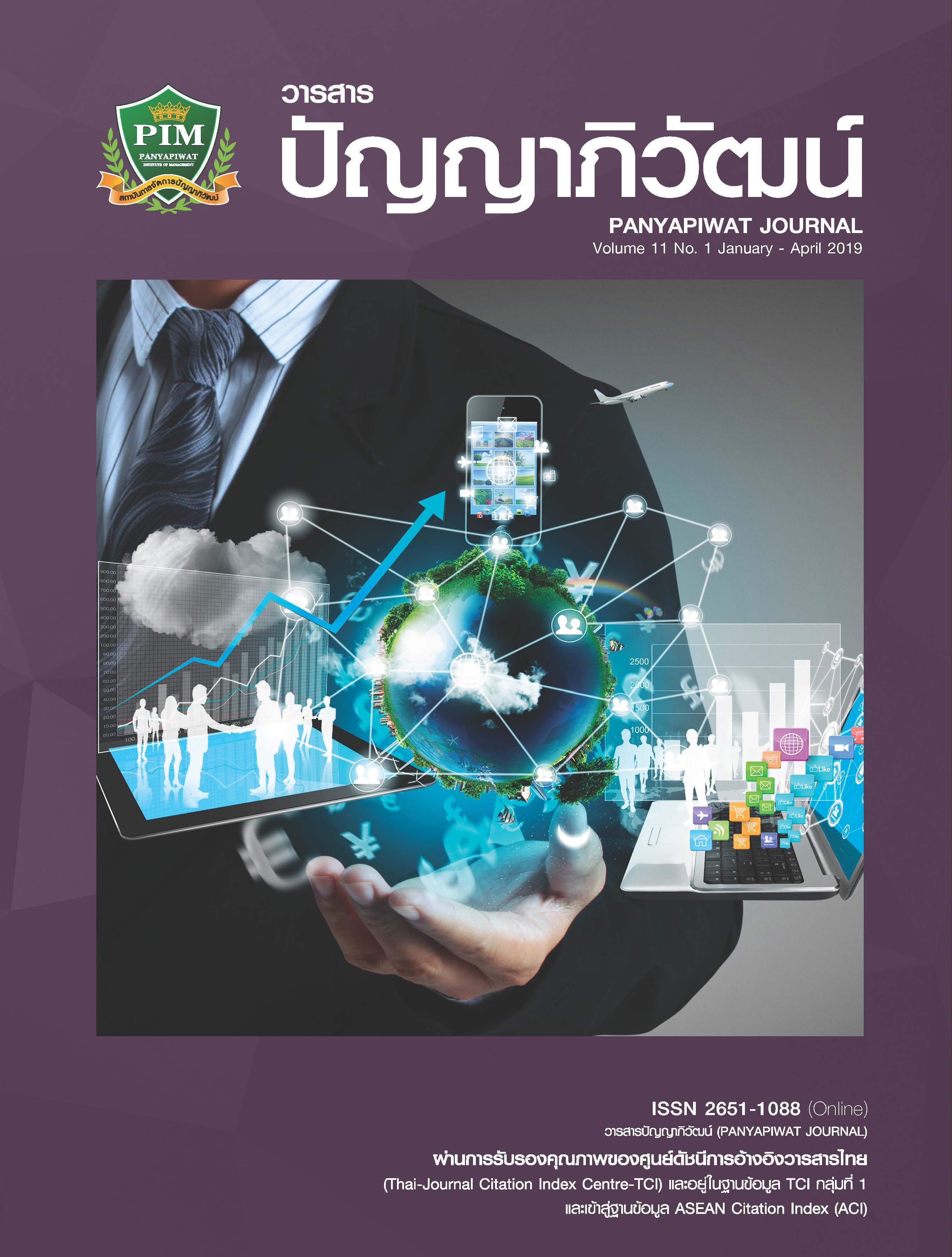การเปรียบเทียบความพึงพอใจของผู้ขนส่งสินค้าที่มีต่อระบบการจัดการขนส่ง ตามลักษณะทางกายภาพคลังสินค้าและลักษณะงาน
Main Article Content
บทคัดย่อ
งานวิจัยนี้มีวัตถุประสงค์เพื่อศึกษาความพึงพอใจของผู้ขนส่งสินค้าที่มีต่อระบบการจัดการขนส่งใน 3 ด้าน
ได้แก่ ด้านการบริหาร ด้านสถานที่ และด้านค่าตอบแทน นำมาเปรียบเทียบความพึงพอใจดังกล่าวตามลักษณะทาง
กายภาพคลังสินค้าและลักษณะงาน โดยมีวิธีการดำเนินการวิจัยเชิงปริมาณ (Quantitative Research) กลุ่มตัวอย่าง
คือ พนักงานที่อยู่ในระบบการกระจายสินค้าของประเทศไทย สุ่มกลุ่มตัวอย่างแบบเจาะจง (Purposive Sampling)
ในจังหวัดที่มีสัดส่วนของข้อมูลการขนส่งและโลจิสติกส์สูง จำนวน 10 จังหวัด ตัวอย่างจำนวน 384 คน การเก็บ
รวบรวมข้อมูลด้วยแบบสอบถาม และวิเคราะห์ผลข้อมูลด้วยสถิติพรรณา (Descriptive Statistic) ได้แก่ จำนวน
ร้อยละ ค่าเฉลี่ย และค่าเบี่ยงเบนมาตรฐาน สถิติอนุมาน (Inferential Statistic) ได้แก่ การวิเคราะห์ความแปรปรวน
แบบทางเดียว (One-way Analysis of Variance) และทดสอบค่าเฉลี่ยรายคู่ด้วยสถิติ Fisher’s LSD (Least
Signifcant Difference)
ผลการวิจัยพบว่า จากศูนย์กระจายสินค้า 10 จังหวัด ส่วนใหญ่ตั้งอยู่ในภาคกลาง ร้อยละ 61.5 เป็นศูนย์
กระจายสินค้าประเภทอุปโภคบริโภค (Dry Grocery Distribution Center) ร้อยละ 59.6 กลุ่มตัวอย่างส่วนใหญ่เป็น
พนักงานขับรถที่เป็นรถของตนเอง ร้อยละ 44.3 ปฏิบัติงานมาแล้ว 1-5 ปี ร้อยละ 48.7 มีความความพึงพอใจต่อ
ระบบการจัดการขนส่งในภาพรวมอยู่ที่ระดับความพึงพอใจปานกลาง (ค่าเฉลี่ย 3.26) ผลการทดสอบสมมติฐาน
พบว่า ตัวแปรประเภทคลังสินค้า มีผลต่อความพึงพอใจด้านสถานที่ ตัวแปรด้านตำแหน่งงาน มีผลต่อความพึงพอใจ
ในภาพรวม ด้านการบริหาร และค่าตอบแทน และตัวแปรระยะเวลาการปฏิบัติงาน มีผลต่อความพึงพอใจด้านการบริหาร
อย่างมีนัยสำคัญทางสถิติที่ระดับ 0.05 ส่วนตัวแปรด้านแหล่งที่ตั้งของคลังสินค้า ไม่พบผลต่อความพึงพอใจในทุกด้าน
Article Details
“ข้าพเจ้าและผู้เขียนร่วม (ถ้ามี) ขอรับรองว่า บทความที่เสนอมานี้ยังไม่เคยได้รับการตีพิมพ์และไม่ได้อยู่ระหว่างกระบวนการพิจารณาลงตีพิมพ์ในวารสารหรือแหล่งเผยแพร่อื่นใด ข้าพเจ้าและผู้เขียนร่วมยอมรับหลักเกณฑ์การพิจารณาต้นฉบับ ทั้งยินยอมให้กองบรรณาธิการมีสิทธิ์พิจารณาและตรวจแก้ต้นฉบับได้ตามที่เห็นสมควร พร้อมนี้ขอมอบลิขสิทธิ์บทความที่ได้รับการตีพิมพ์ให้แก่สถาบันการจัดการปัญญาภิวัฒน์หากมีการฟ้องร้องเรื่องการละเมิดลิขสิทธิ์เกี่ยวกับภาพ กราฟ ข้อความส่วนใดส่วนหนึ่งและ/หรือข้อคิดเห็นที่ปรากฏในบทความข้าพเจ้าและผู้เขียนร่วมยินยอมรับผิดชอบแต่เพียงฝ่ายเดียว”
เอกสารอ้างอิง
Bhatti, K. & Qureshi, T. (2007). Impact of employee participation on job satisfaction, employee commitment and employee productivity. International Review of Business Research Papers, 3(2), 54-68.
Cross, B. & Travaglione, A. (2004). The times they are a-changing: who will stay and who will go in a downsizing organization? Personnel Review, 33(3), 275-290.
Field, D. & Johnson, I. (1993). Satisfaction and change: a survey of volunteers in a hospice organization. Social Science and Medicine, 36(12), 1625-1633.
Maneetrakunthong, A. (2014). Pay for Performance and Work Culture in Thailand. MBA-KKU Journal, 7(1), 21-38. [in Thai]
Mentzer, J. T., Daniel, J. F. & Kent, J. L. (1999). Developing a Logistics Service Quality Scale. Journal of Business Logistics, 20(1), 9-32.
Morse, N. C. (1977). Satisfactions in the white-collar job. North Stratford: Ayer publishing. Offce of The National
Economic and Development. (2018). Thailand’s Logistics Development Strategy 3th (2007-2011). Bangkok: Prime Minister’s Offce. [in Thai]
Pratep, S. (2014). The Development Service of the Singtarual Phatthalung Logistics. Veridian E-Journal, 7(2), 1094-1102. [in Thai]
Prime Minister’s Offce. (2018). The Twelfth National Economic and Social Development Plan (2017-2021). Bangkok: Prime Minister’s Offce. [in Thai]
Smithikrai, C. (2014). Industrial and Organizational Psychology (2nd ed.). Bangkok: V print (1991) Company. [in Thai]
Sorat, T. (2007). The importance Regional Logistics Hubs in The Greater Mekong. Retrieved April 18, 2018, from https://www.tanitsorat.com/view.php?id=51 [in Thai]
Sun, I. S., Yoo, D. K. & Yang, H. C. (2016). The Empirical Study of Logistics Service Quality Factors influencing Service Satisfaction on Supplying the Industrial Goods in the Tourism and Leisure Industry: Focusing on the Moderating Effects of Job Types. International Journal of u- and e- Service, Science and Technology, 9(4), 203-212.
The Knowledge Management Institute Foundation. (2018). Thailand 4.0 Model Drive of Thailand towards Stability, Wealth and Sustainable. Bangkok: The Knowledge Management Institute Foundation. [in Thai]


